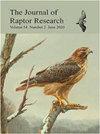筑巢草原隼的父母角色与反向性二态性的关系
IF 1.2
4区 生物学
Q2 ORNITHOLOGY
引用次数: 0
摘要
在草原隼(Falco mexicanus)中,雌性要比雄性大得多,这与大多数日行性猎食鸟类一样。这种现象被称为反向性二态性(RSD),通常与父母照顾不对称有关:在筑巢季节,体型较小的雄鸟提供大部分食物,而体型较大的雌鸟则孵蛋、育雏和保护幼鸟。为了评估草原隼的这种关系,我们对在爱达荷州西南部筑巢的52对草原隼的父母角色进行了定量评估,时间跨度为4年(1984-1987年)。我们收集了每对猎鹰从建立筑巢领地到幼鸟30-35天大(羽龄)期间的行为观察数据,共计613个观察日(9089小时)。我们发现,雄性和雌性猎鹰共同承担了一些任务,但不一定均等,包括孵化、提供猎物和巢穴防御。雌性占昼间孵化责任的三分之二,雄性占三分之一。雌雄在提供食物方面的努力不相上下;同样,巢的防御(这里指与(潜在的)巢内捕食者的攻击性互动)在雌雄之间也没有差别。其他行为,如育雏、狩猎和筑巢等,雌雄个体之间的差异并不大。育雏主要由雌性进行,与雄性相比,雌性出巢率一直较高。雄性狩猎的次数明显多于雌性,而且雄性将大部分猎物送到巢穴。总体而言,在我们的研究中,筑巢的草原隼所表现出的性别角色与基于 RSD 的预测基本一致。本文章由计算机程序翻译,如有差异,请以英文原文为准。
Parental Roles of Nesting Prairie Falcons in Relation to Reversed Sexual Dimorphism
In Prairie Falcons (Falco mexicanus), females are considerably larger than males, as in most diurnal birds of prey. This phenomenon, known as reversed sexual dimorphism (RSD), is usually associated with asymmetry in parental care: the smaller male provides most of the food during the nesting season, whereas the larger female incubates the eggs, and broods and protects the young. To evaluate this relationship in Prairie Falcons, we quantitatively assessed parental roles of 52 pairs of Prairie Falcons nesting in southwestern Idaho, over a 4-yr period (1984–1987). We collected behavioral observations for each pair, from the establishment of a nesting territory until young were 30–35 d old (fledging age), for a total of 613 observation days (9089 hr). We found that male and female falcons shared some tasks, although not necessarily equally, including incubation, provisioning prey and nest defense. Females accounted for two-thirds of the diurnal incubation responsibility and males for one-third. Males and females made comparable efforts in food provisioning; similarly, nest defense, here defined as aggressive interactions with (potential) nest predators, did not differ between the sexes. Other behaviors, such as brooding, hunting, and nest attendance were performed more by one sex than the other. Brooding was carried out primarily by females, and they showed consistently higher nest attendance compared to males. Males hunted significantly more than females and delivered most prey items to the nest site. Overall, sex roles exhibited by nesting Prairie Falcons in our study largely agreed with predictions based on RSD.
求助全文
通过发布文献求助,成功后即可免费获取论文全文。
去求助
来源期刊

Journal of Raptor Research
生物-鸟类学
CiteScore
2.30
自引率
17.60%
发文量
61
审稿时长
>12 weeks
期刊介绍:
The Journal of Raptor Research (JRR) is an international scientific journal dedicated entirely to the dissemination of information about birds of prey. Established in 1967, JRR has published peer-reviewed research on raptor ecology, behavior, life history, conservation, and techniques. JRR is available quarterly to members in electronic and paper format.
 求助内容:
求助内容: 应助结果提醒方式:
应助结果提醒方式:


